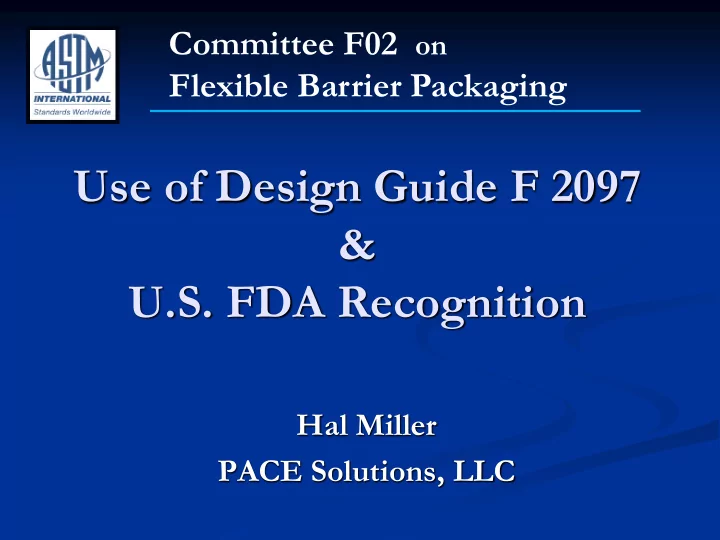

Committee F02 on Flexible Barrier Packaging Use of Design Guide F 2097 & U.S. FDA Recognition Hal Miller PACE Solutions, LLC
Note: This guide was originally developed for medical device packaging; however, it applies to the design and evaluation of any flexible package.
Objectives How to effectively use the Design Guide Which standards are Recognized Consensus Standards by the U.S. FDA/CDRH What are Recognized Consensus Standards How to access and use the FDA Recognized Consensus Standards database
1. Scope 1.1 This guide provides directions for the design and evaluation of primary flexible packages for medical products. The package materials must be selected appropriately for manufacturing process, end use, and the product being packaged.
1. Scope (continued) 1.2 This guide provides a compendium of test methods, practices, and procedures. Specific individual test methods must be selected based on the pertinent characteristics of the specific product to be packaged and the purpose for testing, research and development, or compliance. Not all test methods will be applicable.
1. Scope (continued) 1.3 This guide does not address acceptability criteria, which need to be determined jointly by the package producer and the medical products manufacturer. 1.4 This guide does not assess the product to be packaged or the sterilization method to be used.
F2097 Overview Compendium of commonly used test methods, practices and guides Applicable standards also from TAPPI, ISO, ISTA, and U.S. Military Focus on flexible packaging Usefulness extends into other industries
F2097 – How to use it Organized into eight categories: Safety (properties) Barrier (properties) Durability (physical properties) Package Integrity and Seal Strength Visibility and Appearance Processing Printed Ink Package Performance (in last revision)
Fig. 1 – Summary of Test Methods. . . Quick reference guide Grouped by property category and subcategories (Add new pages (2))
Fig. 1 – Summary of Test Methods. . . Package performance was added in the last revision
F2097 – How to use it Assess package requirements in each of the categories Select the appropriate test methods for: – Package Design: characterization of materials and evaluation of resultant package – Package Compliance: routine monitoring of adherence to specifications
Selecting a Test Method For Example, Barrier Testing Identifies all standards associated with this property
Selecting a Test Method Table 1 Test Description and Applicability Description Applicability How Used “ R&D evaluation ”: characterization of materials and evaluation of resultant package “ Compliance testing ” : routine monitoring of adherence to specifications
Selecting a Test Method
Use of Design Guide F2097 An extremely useful tool for: Ensuring the appropriate design and evaluation considerations have been made Selecting the appropriate test methods Design and characterization Ongoing compliance assurance
Reference to FDA Recognized Consensus Standards 4. Significance and Use/4.2 NOTE 1 Many of the standards included in this guide are consensus standards that are recognized by the United States Food and Drug Administration (FDA). Selection and use of a U.S. FDA recognized consensus standard is voluntary and the sole responsibility of the user in determining its applicability. For further information, consult the U.S. FDA Medical Device Standards Program .
FDA Recognized Consensus Standards in F2097 Additional standards currently not in F2097 D903 Peel Strength of Adhesive Bonds D4332 Standard Practice for Conditioning F17 Terminology F2825 Standard Practice for Climatic Stress
Recognized FDA Standards Totally voluntary What will this do for you? Minimize submissions data and documentation (declaration of conformity to standards for premarket submissions) Tells the FDA reviewer or inspector that this standard is acceptable to use Typically, eliminates test data submission
Must I use only recognized FDA standards? No… If the standard is technically sound and is better for your package or process, it is completely acceptable to use. ISO 11607-1 Annex B (informative) lists numerous standards that may be used for compliance, and many not recognized by the FDA.
EN / ISO 11607-1 Annex B Table B.1 Test methods and their status* * Note: ISO 11607-1 Admendment 1, which includes the new Table B.1, is currently at DIS status
http://www.accessdata.fda.gov/scripts/ cdrh/cfdocs/cfStandards/search.cfm
Click
ASTM F2097 in Summary: A compendium of test methods and standards for flexible barrier packaging materials and packages A U.S. FDA Recognized Consensus Standard A reliable guide for selecting which standards to use based on applicability
Appendix Helpful Links: ASTM International http://www.astm.org FDA Medical Device Standards Program www.fda.gov/MedicalDevices/DeviceRegulationand Guidance/Standards/default.htm FDA Medical Device Standards Database http://www.accessdata.fda.gov/scripts/cdrh/cfdocs/ cfStandards/search.cfm ISO http://www.iso.org
Recommend
More recommend